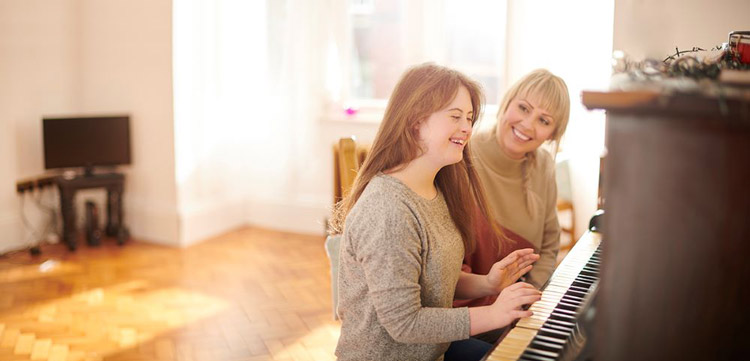UNIT 5. INTEGRACIÓ SOCIAL.
READING
Answer in your diary the following questions.
LISTENING.
WRITING EMAILS.
Writing an email to a friend giving news.
LISTENING
READING.

THE POWER OF MUSIC FOR PEOPLE WITH A DISABILITY.
Answer the following questions.
- What are some of the health benefits of music therapy mentioned in the text? Provide specific examples.
- How does music therapy assist individuals with disabilities in terms of learning and memory?
- In what ways can music help calm anxieties and manage stress according to the article?
- Discuss how music can improve communication skills for individuals with disabilities. What specific methods are mentioned?
- The text states that music can "equalize people socially." What does this mean, and how does music facilitate social interaction among individuals with and without disabilities?
- Identify and explain the significance of the phrase "the show must go on" in the context of how musicians are adapting to social distancing.
- Reflect on the idea that music can be personalized to one’s individuality. Why is this aspect important for people with disabilities, and how might it affect their emotional well-being?
LISTENING. MUSIC THERAPY.
1. What primary purpose does the Center for music therapy serve?
a. To provide traditional music lessons
b. To enhance communication through music
c. To host concerts for the community
d. To train music therapists
2. According to the video, how does music affect learning?
a. It has no impact on learning
b. It decreases the rate of learning
c. It improves the rate of learning
d. It only helps with memorization
3. What is emphasized as a key benefit of music therapy for adults with disabilities?
a. It promotes isolation
b. It fosters a relationship with music
c. It focuses solely on performance skills
d. It replaces traditional therapy methods
4. What activity was highlighted in the video as a way to communicate through music?
a. Singing popular songs
b. Playing instruments
c. Experimenting with sound
d. Writing lyrics
5. What common experience do participants relate to, as mentioned in the video?
a. Playing sports
b. Eating food
c. Traveling
d. Attending school
SUGGESTIONS FOR CHRISTMAS IN CASE YOU GET BORED AND GET OBSESSED WITH WATCHING FILMS IN ENGLISH. :)
FILM: Playing homage to Maggy Smith.
From the writer of Downton Abbey - A haunting ghost story spanning two worlds, more than a century apart. When 13-year-old Tolly finds he can mysteriously travel between the two, he begins an adventure that unlocks family secrets laid buried for generations.
ANSWERS.
Reading. THE POWER OF MUSIC FOR PEOPLE WITH DISABILITIES.
- Health benefits include improving behaviors and emotions, aiding in pain management, and enhancing learning and memory.
- Music therapy aids learning and memory by using rhythm to enhance recall and improve repetition and memorization skills.
- Music calms anxieties and relaxes individuals when stressed or over-stimulated by providing a soothing and familiar auditory environment.
- Music improves communication by stimulating speech and enabling nonverbal forms of communication, such as through rhythm and melody.
- "Equalize people socially" means that music allows individuals with disabilities to interact and participate alongside those without disabilities, fostering inclusion and social bonding.
- The phrase emphasizes the resilience of musicians who continue to perform and connect with audiences through digital platforms despite challenges posed by social distancing.
- Personalization of music is crucial as it allows individuals with disabilities to find specific genres or artists that resonate with them, enhancing their emotional expression and overall satisfaction.
Listening. Music therapy.
- b. To enhance communication through music (00:00:05)
- c. It improves the rate of learning (00:00:44)
- b. It fosters a relationship with music (00:00:22)
- c. Experimenting with sound (00:00:22)
- b. Eating food (00:01:05)

Comments
Post a Comment